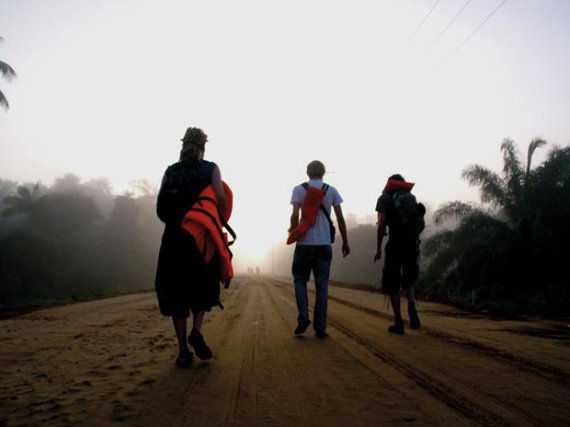Local farmers in Ricanau Mofo call the small farms reclaimed from nature ‘kostgrondjes’ [food plots]. Carving them out of the jungle is very hard work, and all to be able to grow a crop for just one or two years. Would other crops or cultivation methods enable the inhabitants to till the land for a longer period of time? This was one of the assignments for a group of VHL students who went to Suriname in November and December. Plagued by mosquitoes, tropical rain storms and soggy marshy soils, 21 students from VHL and the Institute for Middle-level Natural Resources and Engineering Studies (Natin) charted the vegetation, land-use and stand density in and around Moengo, an area northeast of the capital Paramaribo. They also interviewed local people about the socioeconomic circumstances there. Back in the Netherlands, the students will use all this information in the coming weeks as the basis for a sustainable forest management plan. This plan will advise on how to make a profit from wood and forest by-products such as medicinal herbs without harming nature.
Warm and damp
Some of the students did their research in Ovia Holo. Kees van Vliet belonged to a group which went to Ricanau Mofo to look into the ‘kostgrondjes’ problem. Kees calls the study trip a ‘learning adventure’. ‘It wasn’t always easy. It is warm and damp, you sweat a lot, there are mosquitoes and the food is different. But that is exactly the challenge I look for in a project like this. Your data no longer come from a book; you have to gather them yourself.’ The nicest part for him was the close contact with the locals. ‘Every day, someone from the village went along to guide us on our expedition in the forest. We would easily have got lost, but he knew the area like the back of his hand. On the way, he told us all sorts of things about what grew in the forest, and how he knew if it would rain from the position of the sun or the behaviour of ants. You won’t learn about things like that sitting in the lecture theatre.’
Pioneers
The collaboration with the Surinamese students in Natin went well too, adds Kees. ‘They learned from our theoretical knowhow and we in turn benefitted from their practical experience and knowledge of the vegetation. We worked at various sites, but we all returned in the evenings to the place where we were staying. There, we processed the collected data and ate together. The climax was a football match, with the Netherlands against Suriname. But the funny part is I don’t remember who won!’ It would be ideal if the villagers could now make a success of the management plan. But will that happen? Kees: ‘There is no money for supervising its implementation, so they would have to use our advice as a guide to do it on their own. We hope that a couple of enthusiastic families will be the pioneers and take the lead. Then, hopefully, more will follow.’

